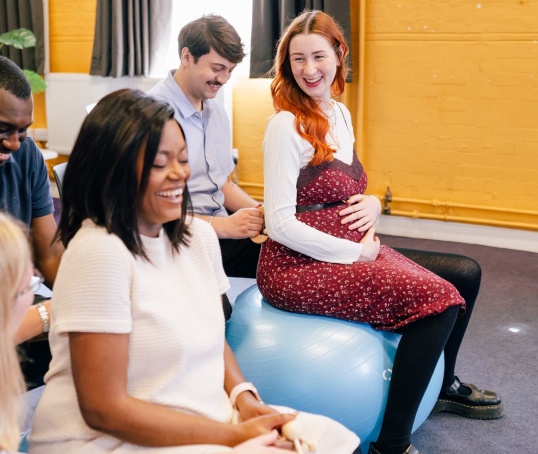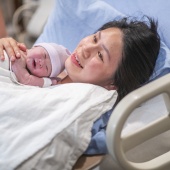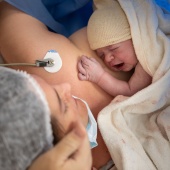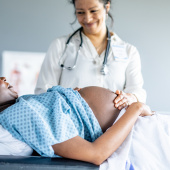How is pregnancy different when carrying twins or multiples, and what birth options are available? Find out more.
What do we mean by twins and multiples?
Multiple birth is when a pregnancy is with more than one baby – this might be twins (two babies), triplets (three babies) or more. It happens in about one in 60 pregnancies (RCOG, 2023).
While one third of twins will be identical, two thirds will be non-identical, or 'fraternal' twins (NHS, 2022a).
- Identical twins come from a single fertilised egg. This egg then divides into two, each of which develop into a baby with the same genes. Identical twins are always the same sex. Every pregnancy has a 1 in 250 chance of identical twins (NHS, 2022a).
- Non-identical twins are more common. They occur when two separate eggs are fertilised and implant into the womb. The twins are no more alike than any other siblings, and may be the same or different sexes (NHS, 2022a).
Fraternal twins are more likely if the mother or birthing person (NHS, 2022a):
- has had IVF and more than one embryo was transferred
- has inherited a tendency to release more than one egg at a time. This is why some families tend to have twins.
- is over 35, because it’s more likely that more than one egg is released at a time
- is from some ethnic groups – twins are most likely in Nigerian families, and least likely in Japanese families
Twins Trust have more information on identical and fraternal twins.
What happens when you are pregnant with multiples?
Parents will usually find out if they’re expecting multiples at the 12-week scan. If there are multiples, they will also find out if the babies share a placenta (NHS, 2022a).
When babies share a placenta they are identical. If they have separate placentas, they may or may not be identical. Additional scans may be offered to clarify (NHS, 2022a).
Like other pregnancies, the mother or birthing parent will be offered screening for health conditions at 12-14 weeks.
Most pregnancies are healthy, resulting in healthy babies (RCOG, 2023).
However, because complications are more common with multiple pregnancies the pregnant woman or birthing person will be offered additional scans and checks. A specialist healthcare team will monitor and support the pregnancy. This is to help avoid any more serious problems (RCOG, 2023).
What is twin-to-twin transfusion syndrome?
In around 15 in 100 pregnancies with identical twins, the blood flow to the babies may not be equal. So one baby receives more blood, and the other baby less. This is called twin-to-twin transfusion syndrome (TTTS). For 85 in 100 identical twin pregnancies this does not happen (RCOG, 2023).
The healthcare team will check for signs of TTTS, which may be mild or more serious. Serious cases will be treated in hospital with specialist care (RCOG, 2023).
How are twins and multiples born?
Twins or multiples are more likely to be born earlier than a single baby. This may be because labour starts early, or because the healthcare team recommend an earlier birth. Babies born earlier or smaller are more likely to need special care (NHS, 2022b; RCOG, 2023).
The healthcare team will recommend giving birth in hospital with medical support (RCOG, 2023). Some parents are comfortable with accepting this offer, and others decline it.
The team may also recommend having a planned birth, earlier than the estimated due date. The exact suggestion will depend on the type of multiple pregnancy and everyone’s health (RCOG, 2023).
This is currently believed to be safer than waiting until full term, though recent research has suggested this may not always be the case. The recommendation can be declined and instead weekly appointments to monitor the pregnancy will be offered (NICE, 2024).
What kind of birth will I have with twins or multiples?
The midwife or doctor will start discussing the birth with the mother or birthing parent from about 24 weeks.
The type of birth planned will depend on individual circumstances, including (RCOG, 2024):
- the kind of multiple pregnancy
- how the babies are lying in the womb
- how well they’re growing
- how the mother or pregnant person would like to give birth
With an uncomplicated pregnancy with twins, both vaginal birth (with or without an induction of labour) and caesarean birth are possible if (NICE, 2024):
- the pregnancy is uncomplicated and has passed 32 weeks
- the first baby is head down
- the babies are of roughly equal size
For other women and pregnant people, caesarean birth is recommended. This includes almost all triplets (NICE, 2024). Both vaginal and caesarean birth have benefits and drawbacks (RCOG, 2023).
Vaginal birth with twins
Labour will be much like that of a single baby. This includes pain relief, though labouring in water may not be offered and epidural will be encouraged. This should be discussed during pregnancy (Twins Trust, no date).
In hospital, additional measures will be recommended, including (NHS, 2022b; RCOG, 2023):
- a small tube (cannula) in the mother or birthing parent’s hand in case medication to strengthen contractions is needed
- epidural pain relief may be put in place but not given straight away, in case the baby or babies need to be born quickly by caesarean or assisted birth
- continuous monitoring of the babies’ heartbeats with a cardiotocograph [car-dee-o-toc-o-graph] machine which uses sensors on the bump held in place with a wide elastic belt
- a monitor attached to the first baby’s scalp via the vagina
- additional staff to support the extra baby – for example, an extra midwife, an obstetrician [ob-ste-trish-an], and one or two neonatologists [nee-o-nat-ol-o-jist] –doctors specialising in newborn babies
There is likely to be a gap of around 30 minutes between babies (RCOG, 2023).
Very occasionally, it might be safest for the second baby to be born by caesarean birth (RCOG, 2023).
After both babies and their placentas have been born, the mother or birthing person will be offered medication to reduce the chance of heavy bleeding (RCOG, 2023).
Caesarean birth with twins and more
Almost all triplets, and over half of twins are born by caesarean (NHS, 2022b).
As with any birth, sometimes a vaginal birth is planned at the start of labour, and later the plan changes to caesarean birth. This happens for more than a third of women or birthing people who plan a twin or multiple vaginal birth (NICE, 2024).
Less often, a caesarean is planned, but the baby is born vaginally before it can happen. Sometimes, the second baby is born by caesarean after the first is born vaginally (NICE, 2024).
Caesarean birth is recommended when (NHS, 2022b):
- the pregnancy is more complicated
- the placenta is blocking the cervix
- the baby nearest the cervix is not head down
- the babies share a placenta
- birth is before 32 weeks
- there has been a previous complicated birth or caesarean birth
As with vaginal birth, there will be more staff for the additional baby or babies (NHS, 2022b).
After the birth
The mother or birthing parent will receive the same routine postnatal care after a multiple birth as after a single birth.
It can be a good idea to plan additional postnatal support before the birth, as looking after two babies is different from one.
If you have family or friends to call on this might include getting meals delivered or having lifts to activity or support groups until you feel more confident.
Organisations for parents of multiple babies, such as Twins Trust, can also provide information and support. Parents tell us that making contact with a local group before the birth makes it easier to reach out after the birth.
Recent research
Twins and multiples are often smaller at birth than singletons. Historically, it was believed the babies were competing for nutrition (Gleason et al, 2025).
Recent research showed that twins start out smaller in pregnancy than singletons. In this research the placenta was healthy, and the babies were well nourished with no other health issues (Gleason et al, 2025).
So, a new theory is that the slower growth is a normal adaptation in twins. Perhaps so the pregnant body will be able to manage the increased needs of two babies later in pregnancy (Gleason et al, 2025).
Understanding that it is normal for twins and multiples to be smaller for longer could have implications for how those pregnancies are supported by health professionals. If the smaller size is not a problem, the babies may not need to be born earlier.
Feeding twins and multiples
Information about feeding is shared by the healthcare team during pregnancy, and support offered after the birth.
Expressing colostrum in late pregnancy will be suggested so there is some ready for the babies when they are born (RCOG, 2023). This is particularly valuable for small and premature babies, so may be worth considering however you plan to feed your babies.
It is possible to breastfeed twins and multiples, and some parents choose to do this for a long time. In the early weeks the breastfeeding mother or parent can experiment with different positions. We also have information on feeding premature babies.
Our Breastfeeding Counsellors are on hand to answer any questions, however you’re feeding your baby. Call our Infant Feeding Line on 0300 330 0700. The line is open every day of the year, from 8am to midnight.
How you might be feeling about having twins or more
Expecting twins or more can feel very challenging. Both socially and financially there will be a bigger impact on the family than a single baby. This can affect the family’s mental wellbeing.
Where to access support and more information
Families in England, Wales and Northern Ireland who are expecting their first set of twins or more might be able to qualify for the Sure Start Grant. In Scotland, this is the Pregnancy and Baby payment (Gov.uk, no date).
Twins Trust – Helpline
Home Start – Twins, triplets, and multiple children
Royal College of Obstetricians and Gynaecologists – Having more than one baby
Gleason JL, Lee W, Chen Z, et al. (2025) Fetal Body Composition in Twins and Singletons. JAMA Pediatr. 179(6):630–638. https://doi.org/10.1001/jamapediatrics.2025.0116
Gov.uk (no date) Sure Start Maternity Grant. https://www.gov.uk/sure-start-maternity-grant [8 Jul 25]
NHS (2022a) Pregnant with twins. https://www.nhs.uk/pregnancy/finding-out/pregnant-with-twins/ [8 Jul 25]
NHS (2022b) Giving birth to twins or more. https://www.nhs.uk/pregnancy/labour-and-birth/what-happens/giving-birth… [8 Jul 25]
NICE (2024) Twin and triplet pregnancy [NG137]. https://www.nice.org.uk/guidance/ng137 [8 Jul 25]
RCOG (2023) Multiple pregnancy: having more than one baby. https://www.rcog.org.uk/for-the-public/browse-our-patient-information/m… [8 Jul 25]
Twins Trust (no date) Birth preferences: Pain relief. https://twinstrust.org/information/pregnancy-and-birth/preparing-for-bi… [1 Sep 25]







